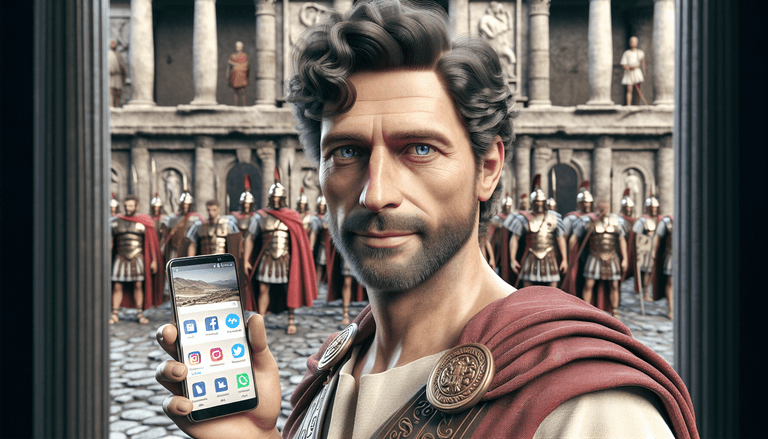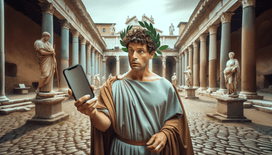Imagine, if you will, a world where the ancient city of Rome buzzes not with the clatter of chariot wheels but with the silent hum of smartphones. In this alternate universe, Gaius Julius Caesar, the iconic figure draped in a scarlet toga, stands poised not in front of a grand senate but with his finger hovering over "Post" on his Instagram app, ready to share his latest conquest.
#InstaCaesar: Conquest in Stories and Selfies
It’s 49 BC, but with a twist. The river Rubicon is more than a historic threshold; it's Caesar's opportunity for the ultimate selfie moment. A snap of him striding across the shallow waters, captioned "🌊 Crossing into destiny. Carpe diem, baby! #AleaIactaEst," hits his feed faster than the legions can march. His loyal followers, some say fanatically loyal, are glued to their Colosseum-sized screens, swiping through Caesar’s stories faster than one can say "veni, vidi, vici."
In this realm of augmented antiquity, Caesar doesn't wait for word-of-mouth or marble tablets to spread his message. Instead, he employs the power of hashtags to rally the public. Suddenly, Rome isn't just the heart of an empire; it's trending. Forget those boring old senatorial decrees, Caesar’s posts boast more drama than a gladiator’s retirement speech. "Just annexed Gaul," he types, adding a cheeky wink emoji, "and they loved it! #ConqueredWithLove."
The Influencer Generals
Of course, no leader manages their empire alone. Caesar’s cohort, a group of generals easily mistaken for an influencer gang, also harness the power of social media. Mark Antony, famous for his charming rhetoric, becomes the spokesperson in a series of live-streamed campaigns. Viewers watch live as Antony endorses their ill-fated jaunts into Egypt with the hashtag #Cleopatrartopia.
Meanwhile, Brutus, the suspiciously reticent one with a penchant for mysterious captions, keeps his DMs open for potential alliances, opting for subtler strategies. "Tossing daggers, not shade," he cryptically posts, setting the stage for a backstab to end all backstabs.
Beyond Bricks and Mortar... and Mortals
For the Senate, competing with Caesar’s Insta prowess is like gladiators fighting lions in wet slippers: it rarely ends well. Senators find themselves battling to maintain relevance, attempting viral challenges like #LipSyncSenatusConsultum and roping in famous gladiators or renowned poets to expand their follower base.
It's not all post-and-roses for Caesar, though. He faces fierce competition from other influencers of yore. Pompey the Great, peering through his spectacles (an early blend of #vintage and #visionary), strives to outdo Caesar with his own Insta-styled triumphs, only to retreat into infamy akin to a failed unboxing video.
The Democracy Feature: How Votes Became Likes
One might wonder, how is democracy faring in this world of societal selfies and strategic filters? The Senate's attempts at staying relevant mean embracing the modern vote: the "Like" button. Legislators nervously refresh their feeds, hoping for the approval of the public swipe right on their policies.
Caesar, cheekily aware of his power, rolls out polls on policies like "Should we keep expanding? #LikeForYes!" The Romans, simmering in their bathhouses, vote with the ease of a thumb, not quite knowing that these thumbs would up their way into significance in centuries to come.
The Ides of March: "Check your Notifications, Caesar"
Our tale of Instagram intrigues nears its zenith as March approaches, dusted with foreboding. A cryptic notification lands in Caesar’s DM: "Beware the Ides of March." Naturally, Caesar chuckles, a tactician too witty to fret over virtual warnings. "Joking soothsayers," he types back, attaching a rolling-eyes emoji.
Yet as the 15th rolls forth in its sandal-trodden glory, and Caesar's notifications light up like a triumphal parade, the conspirators spring their plan. "Et tu, Brut-Insta?" Caesar might've gasped, watching in disbelief as even his closest companions switch allegiances with the ease of a hashtag turned viral.
#FinalPost?
And so, as Caesar’s phone lay quiet, its last post a poetic nod to embers of the sunset over Rome, a tacit acknowledgement that even emperors can fall, #CivisInstagrameusAeterna, history takes a different, digital turn.
In this playful speculation, we find ourselves questioning how history would adapt to platforms that modern society takes for granted. From the frivolous to the profound, Instagram in Caesar's Rome highlights not just the malleability of power but the delicate balance of celebrity, influence, and governance by social media standards.
And there we are, happily bobbing along the rivulets of a "what if" whimsical historical detour, only this time, with better lighting, filters, and the occasional viral post, because even Caesar knows: pic or it didn’t happen.







